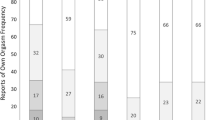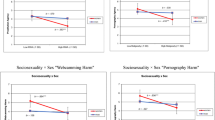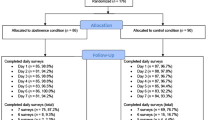Abstract
Literature from sub-Saharan Africa and elsewhere supports a global association between alcohol and HIV risk. However, more rigorous studies using multiple event-level methods find mixed support for this association, suggesting the importance of examining potential moderators of this relationship. The present study explores the assumptions of alcohol expectancy theory and alcohol myopia theory as possible moderators that help elucidate the circumstances under which alcohol may affect individuals’ ability to use a condom. Participants were 82 individuals (58 women, 24 men) living with HIV who completed daily phone interviews for 42 days which assessed daily sexual behavior and alcohol consumption. Logistic generalized estimating equation models were used to examine the potential moderating effects of inhibition conflict and sex-related alcohol outcome expectancies. The data provided some support for both theories and in some cases the moderation effects were stronger when both partners consumed alcohol.






Similar content being viewed by others
References
Bryant KJ, Nelson S, Braithwaite RS, Roach D. Integrating HIV/AIDS and alcohol research. Alcohol Res Health. 2010;33(3):167–78.
Woolf-King SE, Maisto SA. Alcohol use and high-risk sexual behavior in Sub-Saharan Africa: a narrative review. Arch Sex Behav. 2011;40(1):17–42.
Shuper PA, Joharchi N, Irving H, Rehm J. Alcohol as a correlate of unprotected sexual behavior among people living with HIV/AIDS: review and meta-analysis. AIDS Behav. 2009;13(6):1021–36.
Hendershot CS, Stoner SA, Pantalone DW, Simoni JM. Alcohol use and antiretroviral adherence: review and meta-analysis. J Acquir Immune Defic Syndr (1999). 2009;52(2):180.
Pandrea I, Happel KI, Amedee AM, Bagby GJ, Nelson S. Alcohol’s role in hiv transmission and disease progression. Alcohol Res Health. 2010;33(3):203–18.
Baum MK, Rafie C, Lai S, Sales S, Page JB, Campa A. Alcohol use accelerates HIV disease progression. AIDS Res Hum Retroviruses. 2010;26(5):511–8.
Molina PE, Bagby GJ, Nelson S. Biomedical consequences of alcohol use disorders in the HIV-infected host invited review. Curr HIV Res. 2014;12(4):265–75.
UNAIDS. Word AIDS day report fact sheet 2014: UNAIDS. 2014. [cited 2015 February 12]. http://www.unaids.org/en/resources/campaigns/World-AIDS-Day-Report-2014/factsheet.
Organization WH. Global status report on alcohol and health. Geneva: WHO; 2011.
Baliunas D, Rehm J, Irving H, Shuper P. Alcohol consumption and risk of incident human immunodeficiency virus infection: a meta-analysis. Int J Public Health. 2010;55(3):159–66.
Scott-Sheldon LJ, Walstrom P, Carey K, Johnson B, Carey M. Alcohol use and sexual risk behaviors among individuals infected with HIV: a systematic review and meta-analysis 2012 to early 2013. Current HIV/AIDS Rep. 2013;10(4):314–23.
Kiene SM, Simbayi LC, Abrams A, Cloete A, Tennen H, Fisher JD. High rates of unprotected sex occurring among HIV-positive individuals in a daily diary study in South Africa: the role of alcohol use. J Acquir Immune Defic Syndr. 2008;49(2):219–26.
Kiene S, Subramanian SV. Event-level association between alcohol use and unprotected sex during last sex: evidence from population-based surveys in sub-Saharan Africa. BMC Public Health. 2013;13:583.
Leigh BC, Stall R. Substance use and risky sexual behavior for exposure to HIV: issues in methodology, interpretation, and prevention. Am Psychol. 1993;48(10):1035–45.
Weinhardt LS, Carey MP. Does alcohol lead to sexual risk behavior? Findings from event-level research. Annu Rev Sex Res. 2000;11:125–57.
Morojele NK, Kachieng’a MA, Mokoko E, Nkoko MA, Parry CD, Nkowane AM, et al. Alcohol use and sexual behaviour among risky drinkers and bar and shebeen patrons in Gauteng province, South Africa. Soc Sci Med. 2006;62(1):217–27.
Kalichman SC, Simbayi LC, Jooste S, Cain D. Frequency, quantity, and contextual use of alcohol among sexually transmitted infection clinic patients in Cape Town, South Africa. Am J Drug Alcohol Abuse. 2007;33(5):687–98.
Kalichman SC, Simbayi L, Jooste S, Vermaak R, Cain D. Sensation seeking and alcohol use predict HIV transmission risks: prospective study of sexually transmitted infection clinic patients, Cape Town, South Africa. Addict Behav. 2008;33(12):1630–3.
Goldman MS, Del Boca FK, Darkes J. Alcohol expectancy theory: The application of cognitive neuroscience. In: Leonard KE, Blane HT, editors. Psychological theories of drinking and alcoholism. 2nd ed. New York: Guilford; 1999. p. 203–46.
Steele CM, Josephs RA. Alcohol myopia. Its prized and dangerous effects. Am Psychol. 1990;45(8):921–33.
Moss AC, Albery IP. A dual-process model of the alcohol-behavior link for social drinking. Psychol Bull. 2009;135(4):516–30.
Corbin WR, Fromme K. Alcohol use and serial monogamy as risks for sexually transmitted diseases in young adults. Health Psychol. 2002;21(3):229–36.
Dermen KH, Cooper ML. Inhibition conflict and alcohol expectancy as moderators of alcohol’s relationship to condom use. Exp Clin Psychopharmacol. 2000;8(2):198–206.
Dermen KH, Cooper ML, Agocha VB. Sex-related alcohol expectancies as moderators of the relationship between alcohol use and risky sex in adolescents. J Stud Alcohol. 1998;59(1):71–7.
Kalichman SC, Weinhardt L, DiFonzo K, Austin J, Luke W. Sensation seeking and alcohol use as markers of sexual transmission risk behavior in HIV-positive men. Ann Behav Med. 2002;24(3):229–35.
Maisto SA, Carey MP, Carey KB, Gordon CM, Schum JL. Effects of alcohol and expectancies on HIV-related risk perception and behavioral skills in heterosexual women. Exp Clin Psychopharmacol. 2004;12(4):288–97.
Gordon CM, Carey MP, Carey KB. Effects of a drinking event on behavioral skills and condom attitudes in men: implications for HIV risk from a controlled experiment. Health Psychol. 1997;16(5):490–5.
Fromme K, D’Amico EJ, Katz EC. Intoxicated sexual risk taking: an expectancy or cognitive impairment explanation? J Stud Alcohol. 1999;60(1):54–63.
MacDonald TK, MacDonald G, Zanna MP, Fong GT. Alcohol, sexual arousal, and intentions to use condoms in young men: applying alcohol myopia theory to risky sexual behavior. Health Psychol. 2000;19(3):290–8.
Wray TB, Simons JS, Maisto SA. Effects of alcohol intoxication and autonomic arousal on delay discounting and risky sex in young adult heterosexual men. Addict Behav. 2015;42:9–13.
Kiene SM, Fisher WA, Shuper PA, Cornman DH, Christie S, Macdonald S, et al. Understanding HIV transmission risk behavior among HIV-infected South Africans receiving antiretroviral therapy: an information–motivation–behavioral skills model analysis. Health Psychol. 2013;32(8):860–8.
Albarracin D, Johnson BT, Fishbein M, Muellerleile PA. Theories of reasoned action and planned behavior as models of condom use: a meta-analysis. Psychol Bull. 2001;127(1):142–61.
Geter A, Crosby R. Condom refusal and young Black men: the influence of pleasure, sexual partners, and friends. J Urban Health. 2014;91(3):541–6.
Kiene SM, Tennen H, Armeli S. Today I’ll use a condom, but who knows about tomorrow: a daily process study of variability in predictors of condom use. Health Psychol. 2008;27(4):463–72.
Tennen H, Affleck G. Daily process in coping with chronic pain: methods and analytic strategies. In: Ziedner M, Endler NS, editors. Handbook of coping: theory, research, applications. New York: Wiley; 1996. p. 151–77.
Kiene SM, Christie S, Cornman DH, Fisher WA, Shuper PA, Pillay S, et al. Sexual risk behaviour among HIV-positive individuals in clinical care in urban KwaZulu-Natal, South Africa. AIDS. 2006;20:1781–4.
Simbayi LC, Kalichman SC, Cain D, Cherry C, Jooste S, Mathiti V. Alcohol and risks for HIV/AIDS among sexually transmitted infection clinic patients in Cape Town, South Africa. Subst Abus. 2006;27:37–43.
Kiene SM, Barta WD, Zelenski JM, Cothran DL. Why are you bringing up condoms now? The effect of message content on framing effects of condom use messages. Health Psychol. 2005;24:321–6.
Barta W, Portnoy D, Kiene S, Tennen H, Abu-Hasaballah K, Ferrer R. A daily process investigation of alcohol-involved sexual risk behavior among economically disadvantaged problem drinkers living with HIV/AIDS. AIDS Behav. 2008;12(5):729–40.
Dermen KH, Cooper ML. Sex-related alcohol expectancies among adolescents: II. Prediction of drinking in social and sexual situations. Psychol Addict Behav. 1994;8(3):161–8.
Lopez A, Stockwell T, Chikritzhs T. International guide for monitoring alcohol consumption and related harm. Geneva: World Health Organization; 2000.
Simbayi LC, Kalichman SC, Strebel A, Cloete A, Henda N, Mqeketo A. Disclosure of HIV status to sex partners and sexual risk behaviours among HIV-positive men and women, Cape Town, South Africa. Sex Transm Infect. 2007;83:29–34.
Meyer-Weitz A, Reddy P, Van Den Borne HW, Kok G, Pietersen J. Determinants of multi-partner behaviour of male patients with sexually transmitted diseases in South Africa: implications for interventions. Int J Mens Health. 2003;2:149–62.
Wojcicki JM, Malala J. Condom use, power and HIV/AIDS risk: sex-workers bargain for survival in Hillbrow/Joubert Park/Berea, Johannesburg. Soc Sci Med. 2001;53(1):99–121.
Wojcicki JM. She drank his money: survival sex and the problem of violence in taverns in Gauteng province, South Africa. Med Anthropol Q. 2002;16(3):267–93.
Eaton LA, West TV, Kenny DA, Kalichman SC. HIV transmission risk among HIV seroconcordant and serodiscordant couples: dyadic processes of partner selection. AIDS Behav. 2009;13(2):185–95.
Stone AA, Broderick J, Porter L, Krupp L, Gyns M, Paty J, et al. Fatigue and mood in chronic fatigue syndrome patients: results of a momentary assessment protocol examining fatigue and mood levels and diurnal patterns. Ann Behav Med. 1994;16:228–34.
Hayes SC, Cavoir N. Multiple tracking and the reactivity of self-monitoring: I. Negative behaviors. Behav Ther. 1977;8:819–31.
Nelson RO, Hayes SC. Theoretical explanations for reactivity in self-monitoring. Behav Modif. 1981;5:3–14.
Acknowledgments
Supported by the National Institutes of Mental Health (F31MH072547-01 to S.M.K.) by a research development grant from the Center for Health, Intervention and Prevention at the University of Connecticut, a Grant-in-Aid from the Society for the Psychological Study of Social Issues, and by the Clarence J. Rosecrans Research Scholarship from the American Psychological Foundation.
Author information
Authors and Affiliations
Corresponding author
Rights and permissions
About this article
Cite this article
Kiene, S.M., Simbayi, L.C., Abrams, A. et al. Alcohol Expectancies and Inhibition Conflict as Moderators of the Alcohol–Unprotected Sex Relationship: Event-Level Findings from a Daily Diary Study Among Individuals Living with HIV in Cape Town, South Africa. AIDS Behav 20 (Suppl 1), 60–73 (2016). https://doi.org/10.1007/s10461-015-1157-0
Published:
Issue Date:
DOI: https://doi.org/10.1007/s10461-015-1157-0




